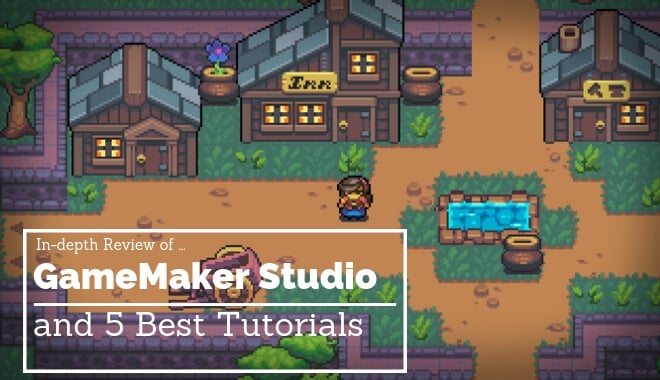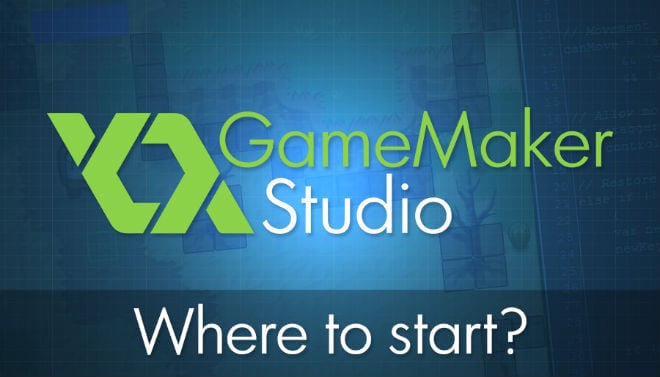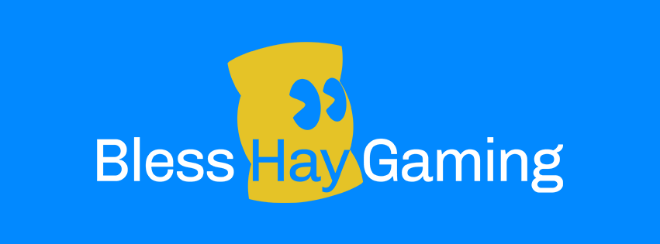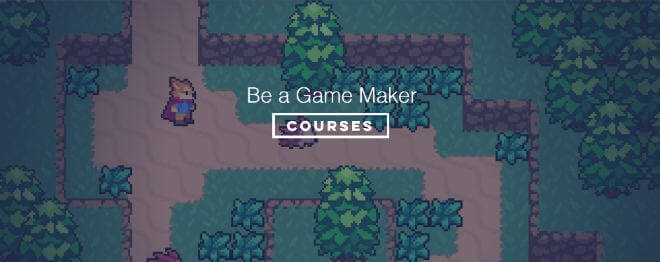
Game Maker Studio is probably one of the most popular engines for 2D top-down or side-view games.
- Nidhogg
- Cook Serve Delicious 2
- Nuclear Throne
- Paper Knight
- Gunpoint
- and the list goes on and on.
If you’re familiar with indie games, you’ll probably notice some of the biggest indie releases in the past few years.
The real question though: is the GameMaker engine right for you?
The Basics of GameMaker
We are huge fans of GameMaker Studio 2 here at gamedesigning.org. Since we have our fingers on the pulse of everything having to do with game design, we see a lot of powerful and underpowered, expensive, and free engines.
GameMaker Studio 2 is a fantastic option for those just beginning their journey. But before I get ahead of myself, let’s look at some basics, comparisons, facts, and what you need to know.
However, to be a little more objective and to set our personal biases aside, we will look at the good and the bad at GameMaker Studio 2, as well as how it stacks up against other more widely used game engines like Unity.
GameMaker Studio does have some stuff that Unity can’t do! But I’m getting ahead of myself. Let’s have some basic history of the engine and see where it leads.
GameMaker History
The very first iteration of GameMaker Studio was released by YoYo Games on 15 November 1999, originally under the name of ‘Animo.’ GameMaker is committed to cross-platform use and functionality.
It has been created with 2D game development at the heart of its mission. Although 3D games are not impossible by any means, 2D is where GamMaker Studio shines.
What Can I Do With GameMaker Studio?
One of the things that GMS spearheaded, is game creation with minimal coding skills.
If you aren’t very program savvy, you can use their visual programming language to drag and drop code. You can run and call functions, alter and interact with files and other data, run scripts, even drop in an in-app purchasing system.
As such, GMS is targeted at novice users, and with their recent overhaul of the drag-and-drop system, it’s even more versatile than ever.
What’s cool here is that you can actually look at the code behind the drag-and-drop boxes. That means that you could theoretically learn to code as you create your game, and customize it according to your needs, even with no coding experience. Of course, that being said, it’s generally best to not be learning a new skill as you’re making a game.
Now, on the other hand, if you do have some programming skills, you can use their own scripting language, creatively called Game Maker Language (GML). GML is based on C, so it’s a little bit outdated in that aspect, with most modern programmers learning C++ or C#. Either way, if you do know how to program, it’s very likely you won’t have any issues getting comfortable with GML.
Part of this easy-of-use philosophy is Game Maker Studio’s ‘Room Editor’. Essentially, this is the building block of your game. With the Room Editor, you can alter layers, use tileset brushes, share code and resources between objects (this system is called ‘inheritance’), and so on.
Furthermore, GMS provides you with a powerful Tileset Editor and Image Editor. Together, they allow you to add animations, create assets quickly, automate tile placement and even create quick and easy animations. All in all, it’s a powerful little toolset.
Of course, it doesn’t end there. GMS offers a lot of extra awesome features:
- GitHub integration
- In-engine debugger
- Easy to use full shader support.
- In-engine Physics.
- A sound mixer
- Behind the scenes Client/Server support.
- Third-party libraries and SDKs
- A GMS marketplace, similar to Unity’s or Unreal’s marketplace.
GameMaker Licenses
The good news is that GameMaker Studio 2 is nearly universal, with support on these platforms:
- Windows Desktop
- Mac
- Ubuntu
- PlayStation
- Xbox
- HTML 5
- Android
- iOS
- Android TV
- fireTV
Whew! What a mouthful.
But the intricate and varied access to all of these platforms allows for any game developer of any stripe to dive in and developer for almost anything you can think of.
Is GameMaker Studio free? Unfortunately, no. The bad news is that GMS has both a subscription model and a permanent license model broken up over 4 categories, so it might get confusing as to which version you’ll need for your budget.
There is a free trial version for those who just want to explore the basics of what the engine has to offer. Along with the free trial, there are three other packages you can purchase in the engine.
How much does Game Maker Studio 2 cost? It depends on the package and licenses you are buying. They vary in size and significance.
GameMaker Free Trials
First of all, there is a free trial of Game Maker Studio. Perfect for exploring the user interface and being immersed in the user experience, the free trial is a great way to navigate the engine with limited restrictions. While you can play around with most of the features of GMS, you cannot save to an executable. It also has a bunch of resource limitations, which you can find here.
- Cost: Free
- The free trial consists of full functionality for Windows for a month.
- Who’s it for?
- Ideal for those who are beginners looking to dip their toes in, or for people who just want to see if it ‘clicks’ for them.
‘Creator’ License
Secondly, there is the ‘Creator’ license.
- Cost: $39 for a 12-month subscription
- It’s available for Windows and Mac
- Who’s it for?
- The Creator package is for the beginning game developer. Although this is a 12-month license, this is the one that a casual game developer would want.
- The Creator license is targeted more to hobbyists rather than people who want to release a full game.
The biggest downside of this license is that you cannot change the splash screen. While at face value that may not be a big issue, pretty much every other game engine out there allows you to change the splash screen once you pay some amount of money.
‘Developer’ License
Thirdly, you have the ‘Developer’ License. The licenses in this category are permanent licenses, which means you buy the license once and that’s it. Here are the details:
- Cost:
- Desktop – Costs $99 for a permanent license and allows you to publish to Windows, Mac, and Ubuntu.
- Amazon Fire – Costs $149 and allows you to publish to Amazon’s Appstore.
- Web – Costs $149 and allows you to publish HTML 5, which is pretty versatile, so it’s a good option.
- Mobile – Costs $399 and allows you to publish to Android, iOS, and Amazon App stores.
- UWP – Costs $399 and allows to you publish to Windows 10, as well as Xbox through the Creator’s Program.
- Who’s it for?
- This is possibly the most ideal if you are a solo developer who already knows their stuff.
‘Console’
Finally, you have the ‘Console’ category, which is mostly subscription-based, except for the UWP license which is permanent. Details below:
- Cost:
- UWP – Same as above.
- Nintendo Switch – Costs $799 for a 12-month license.
- Playstation– Costs $799 for a 12-month license.
- Xbox – Costs $799 for a 12-month license.
- Ultimate – Costs $1500 for a 12-month license, and is essentially a combination of every other single license, so you can publish to any platform that is supported by GMS.
- Who’s it for?
- The console license is the heavy-duty package that is explicitly aimed at developing console titles with GameMaker. This is aimed at teams of developers and moderately sized game studios.
As stated above, the prices are all $799 for each significant console, with the increase to $1500 for the ‘Ultimate’ bundle where the developer has access to a license on all consoles and other platforms.
Among game developers, this is one of the most significant issues. They believe, and with good reason, that these prices are a little insane for an engine aimed at helping beginners on their creative journeys.
It’s probably an appropriate time to mention that there’s also an Education License, but it’s quite complicated, so I’ll just let the company itself describe to you the process.
What Coding Does GameMaker Use?
GameMaker Studio uses its own coding language, aptly named GameMaker Language, or GML. GML is based both on C# and C++ in different ways.
Okay, so earlier, I mentioned that GML, the native programming language of GameMaker Studio 2, was a hodgepodge of different coding languages.
What is GML code? It is a coding language that uses imperatives, (or uses statements and commands to change around the game’s dynamics), and takes the best aspects of JavaScript, and the C-like languages.
GameMaker for 3D?
Of course, it’s not all rainbows and sunny days when it comes to Game Maker Studio. The biggest issue by far is that GMS is absolutely not made for 3D game development. If you’re looking to make a 3D game, then you might want to consider something like Unity or Unreal.
Another issue seems to be YoYo’s (the parent company) tech support. There have been complaints about it being slow. That being said, there is a great and active community, so you can always find some form of help.
While a bit nit-picky, the syntax used with GML isn’t always industry standard. If you don’t have any programming experience and learn through GML, you’ll end up learning a lot of bad practices. So this is definitely something to keep in mind.
There is the stuff mentioned earlier, such as the inability to edit the splash screen even when you pay and the slightly confusing licensing options.
GameMaker Pros and Cons
GameMaker Pros
Is GameMaker Studio 2 easy?
Yes. Compared to other engines that require developers to really know a lot of stuff about coding and programming, GameMaker Studio is a welcoming environment for those both new and old to the game development scene. Don’t have any knowledge of programming? Never fear, because Gamemaker Studio is extremely accommodating to those who are total newbs!
Good and easy tutorials
Any engine worth their salt should have useful resources, either provided by the developers or community at large. Luckily, those who find themselves lost when it comes to Gamemaker Studio’s features are in luck. There are a ton of resources in the form of tutorials, guides, and video walkthroughs. This isn’t some rinky-dink engine; it has a humongous and loyal following online.
Great Stability
Since GameMaker has been around in some form or another, especially in its previous iteration, GameMaker Studio 1, it’s a pretty stable engine The developers, YoYo Games, have their stuff down and you’ll rarely run into any glaring glitches or issues that will ruin your game development journey.
Cross-Platform
As stated before, GameMaker Studio 2 was specially created with cross-platform support in mind. Luckily, this is still one of GameMaker Studio’s strengths. As we move into an era where cross-platform multiplayer games are now the norm rather than the exception, cross-platform development and play have never been more critical, and GameMaker Studio is one of the engines on the front lines.
Also Has 3D capabilities
As I said, you can develop 3D aspects and games in Gamemaker Studio 2. Although it is primarily focused on 2D game development, 3D games are totally possible. Not only that, but 3D development doesn’t infringe on the capabilities of 2D development at all.
Okay, now that the pros are over and done with, let’s check out the cons.
GameMaker Cons
Costs
This can be a pretty big sticking point for some developers, especially those that aren’t part of a company or larger team that can cover or split the costs. The console license is extraordinarily expensive, and having the ultimate license could end up being more of a pipe dream than a reality for a majority of first-time developers.
Too embedded
What do I mean by this? Well, as fantastic as the accessibility is to the first-time programmer and game developers, getting used to GameMaker Studio and GML, in particular, can cause some problems down the road. A developer can learn the ins and outs of GML and become a master at it…but be left in the dust if they decide to move onto something like the Unreal Engine or Unity. The transition to other engines may prove difficult and awkward.
3D underdeveloped
While the access to 3D assets is fantastic, and a definite ‘pro,’ the existing 3D framework leaves much to be desired. Again, the focus is on 2D titles, so it’s understandable, but we still wish that you could make both 2D and 3D games with the same quality.
Overall though, Game Maker Studio is definitely a competitor to Unreal, Unity, and other engines of that caliber. It’s even possible that Game Maker Studio exceeds those engines when it comes to 2D, which is expected in a specialized game engine. There are some downsides, but if you’re going 2D, then you should absolutely consider GMS.
Helpful GameMaker Tutorials

Great, so you’ve taken all that info in, and you want to move forward with using Game Maker Studio. Here are a few resources to get you started on making your very own game:
YoYo Games’ Learning Resources
Handily, YoYo games actually has its great little list of tutorials and guides to get you started on Game Maker Studio.
Most of these are youtube videos giving step-by-step instructions on how to do things. While you won’t likely find any information on the more advanced and varied topics, it’s a great starting place if you have zero experience making games. Also, they’re free, so that’s pretty great!
Udemy Courses
If you want something with a little bit more information and variety, Udemy is a great website for learning resources. Not surprisingly, there are quite a few courses on Game Maker Studio. Here’s two that might tickle your fancy:
The Complete GameMaker Studio 2 Game Development Course
To start, this is a great course made for complete beginners. You don’t need any coding experience, or any design experience, so for those novices out there, this a perfect solution.
Right now it’s going on sale for $9.99, but if you’re reading this when it’s more expensive, you should wait for a sale, or check out one of the other options listed here.
Make an Action RPG in GameMaker Studio 2 (V1.4 Compatible)
If you’ve got a little experience under your belt, and have Action RPGs in mind, this course will help you get accustomed to the more advanced features of Game Maker Studio.
Some of the highlights include programming AI, Inventory systems, using Game Maker Language and damage management systems.
If you’re interested, it’s going on sale for $49.99, but again, if it’s not that price when you’re reading this, wait for a sale, or check out some of the other options.
Bless Hay Gaming

Bless Hay has been a developer making game-related guides and tutorials for a while now, most of them focusing on Game Maker Studio. He’s actually quite experienced, and a lot of people within the community recommend his work. If you’re more of visual learning, this is definitely one you’ll want to check out.
Now, while he himself closed down his youtube channel (apparently some issues with changes in YouTube), you can still access his videos here. One warning though, his accent can be hard to understand from time to time! Thankfully, Hay opened up his own blog with more recent and relevant tips and tricks. You can find all those learning resources here.
Shaun Spalding’s Videos
If you’ve checked out the first link to YoYo’s resources, you’ll be familiar with this name.
Shaun Spalding actually makes tons of tutorial videos on YouTube. He’s also a former Ubisoft game designer, as well as having been the former YoYo games, community manager. So if anything, this guy knows what he’s talking about.
Since he does a lot of different content involving Game Maker Studio, it’s hard to point to a specific video or playlist. Instead, we suggest you check out his channel over here.
The HeartBeast YouTube Channel

If you’re looking for educational content specific to certain genres, then HeartBeast is the way to go. Every so often, a new genre is picked upon which a complete course is made. Right now the focus is on Hack-n-Slash, but there are also Platformers, RPGs and other general videos that teach useful skills.
Incidentally, it’s important to point out that these really are fleshed out courses. That means everything from boss fights to music, to enemy AI, dialogue, art and graphics, coding, and everything in between. So if you prefer to have on a resource to learn from that’s more linear and targeted, this is where you should go.
You can find the HeartBeast YouTube Channel here.
GameMaker Community Forums
Alright, so maybe you’ve got a bit of development under your belt and you want to go for the nitty-gritty under the hood stuff. Maybe you have a very specific issue that you can’t find information on. Well, the best place for that is the community forums:
Game Maker Community Forum
One of the first obvious places is YoYo Games’ own community forum.
There are so many sub-forums and topics, you’re really spoiled for choice. Anything from programming, to graphics design, and general game design. There’s even a specific sub-forum to find others to collaborate with.
Game Maker Reddit
Another really great resource is Reddit.
If you aren’t familiar with Reddit, it’s essentially the same as a forum, the only difference is that there aren’t sub-forums for a specific topic. At face value, it might not seem that great, but since each thread created is asking a specific question, it’s a great resource to find detailed discussions.
Currently, the Game Maker Reddit has over 27k subscribers and is very active.
Bonus Content…
Game Maker Studio vs. Unity
Along with GameMaker Studio, we are big fans of Unity. How could you not be? It has been the reason that some of our favorite games have been released over the past couple of years. But to make things a little clearer, let’s take a quick look at the differences between a more advanced engine like Unity and GameMaker Studio 2.
Is Unity better than GameMaker?
It depends. If only it were clear, but it really does depend on who is using each engine. For those who want to create bigger and more complex games, Unity is probably more your style. It just has more nuanced and complex systems to develop more prominent, more ambitious titles. However, GameMaker Studio 2 is no pushover. Both have their issues, but both have their fantastic benefits as well. Let’s take a closer look at some of the biggest takeaways from both engines and how they stack up against each other.
Is GameMaker good for beginners?
Absolutely. I would say GameMaker Studio 2 is one of the more beginner-friendly game engines that anyone can get their hands on. It promotes the ease of use for all of its users and has a great community willing to help out by providing tutorials and guides.
GMS2 Advantages (or Unity Disadvantages)
Tiles
It’s no contest: GameMaker Studio’s use of tiles blows Unity’s out of the water. It used to be that Unity didn’t even have tiles, so GameMaker won that battle by default. However, Unity caught up in that department but never perfected tiles like GameMaker Studio 2 did.
Performance
The overall performance of both of these engines was actually surprising. GameMaker Studio 2 runs like a dream, with a smooth, reliable performance. Unity, on the other hand, could get a little jerky when it comes to framerate.
This can be remedied by the computer expert, but if you’re a rookie, fixing the performance with Unity could prove to be more complicated than just using GameMaker Studio 2 in the first place.
GML
GML is so beginner-friendly it’s not even close. You could get your grandma to learn how to use GML, compared with native C-like languages used by Unity and other engines. This is perhaps one of, if not, the most significant pros that GameMaker Studio 2 has going for it.
Ease of Use
Not to say that Unity is entirely impossible to learn, but those with no programming background whatsoever will struggle more with Unity than with GameMaker Studio 2. We can’t emphasize enough that GML is a first-time programmer’s best asset here. Overall, side by side, doing nearly everything in Gamemaker Studio 2 seemed a lot easier than doing it in Unity.
What Unity Does Better (or what GMS2 does worse)
UI
Unity has a fantastic user interface. It may take some time to get used to, like with most everything else. Still, Unity’s interface, I have to admit, is more comprehensive and overall better than GameMaker Studio 2’s user interface.
Complex systems that interact with each other
Unity totally nails the complexity involved with C-like programming and interacting complex systems. Unity just has better tools to deal with more nuanced and complex aspects than GameMaker Studio 2.
Exports
Although GameMaker 2 has support on nearly every current platform, Unity is the undisputed king of the hill when it comes to exporting projects and other aspects to other platforms. It has been famous for not compromising on quality through the export process, and that’s a huge plus in its favor.
Final Thoughts on GameMaker Studio 2
Okay, so let’s shoot straight from the hip here.
Is GameMaker Studio good? Yes. For anyone who is looking to dabble in 2D game development or game development in general, GameMaker Studio is a fantastic option for those both starting out or looking for a new engine to explore.
Examine our pros and cons for the gaming engine and decide for yourself. If you’re a total rookie when it comes to programming and intimidated by the entire process, jumping into GameMaker Studio could be a fantastic way to introduce you to comprehensive and fun game design.
Keep in mind, however, that if you move onto more complicated engines, the transition may be a little wonky, as getting used to GML may create a disconnect with other programming languages. Not guaranteed, but something to look out for.
Ultimately, Game Maker Studio is a great engine if you’re looking to make a 2D game and have very little or no coding experience. Even if you do have the experience, GMS offers a ton of features that you’d find on other AAA engines. It can easily compete with Unity and Unreal in the 2D space, and it also has fairly good, although slightly complicated, licensing options.
In addition to that, it’s very well supported, either through Udemy, Youtube Videos, or community forums. So, if you’re a first-time developer or an experienced developer who wants to make a 2D game, definitely check out Game Maker Studio.
Overall, we recommend any game engine that promotes game developers and creative types of any skill level to join the ranks of game creators and famous designers. This means that GameMaker Studio 2 passes our test, and we can wholeheartedly recommend it for use ASAP!

